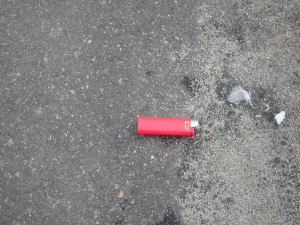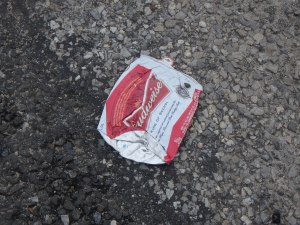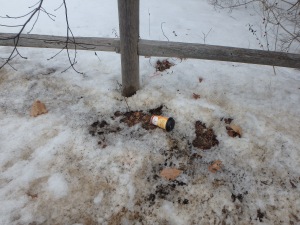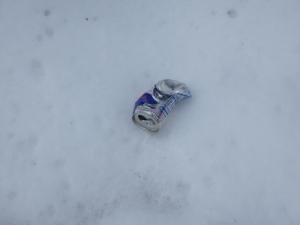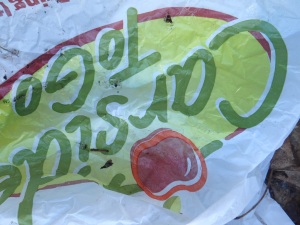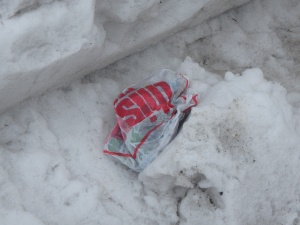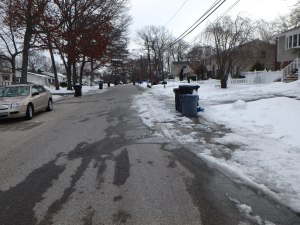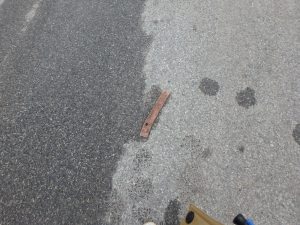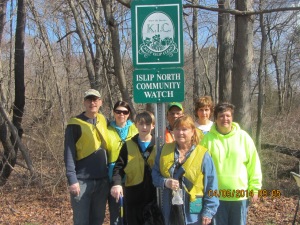Some litter is probably inadvertent.
Other litter is casual,
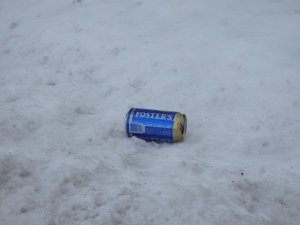
or just the result of bad weather and bad timing.
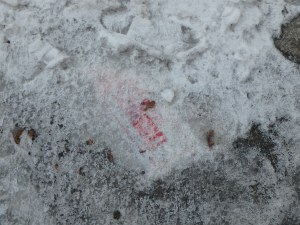
But the bare fact of litter is that it’s all very basic and human: it’s banal.
If the annals of litter were ever written, they would probably describe the occasional litter kingpin (a contractor no doubt), who would roam the night streets looking for a good spot to offload the days demolition: but the real serial litterer is a much more ordinary person. In the end, it’s mostly carelessness, expediency, laziness and inadvertence that contribute to litter. The litterbug, if we were to paint a picture of him or her, is very ordinary; he drinks Budweiser from a can,
enjoys coffee from 7-11 and Dunkin Donuts,
likes those caffeinated energy drinks,
and eats a lot of drive through fast food.
He (and she) leaves the coupon weekly at the curb, likely because he’s not a clipper.
He fills the recycling can to overflowing,
and doesn’t take the time to tidy up after the bulk collectors take away the wreckage from that kitchen demolition.
All of which can add up to a pretty untidy community. Unless someone like me picks it up.
My ‘habit’ of picking up litter makes a lot of difference in how the area looks. I take pride in this, it is a civic good. But if I were to stop cleaning up, the tidiness of the neighborhood would quickly deteriorate. I’m only one person and I’ll be gone one of these days. I’m not alone; other people pick up litter, particularly at organized cleanup events. But I hope to inspire another person or two to start picking up litter as a habit – to take some day-to-day ownership of the neighborhood.
This is not an activity that comes naturally. Most adults wouldn’t readily pick up trash by the curb because it’s not something that we’ve been taught to do. It’s an oversight, really, in our civic upbringing. We didn’t learn this, most of us, in school and in the home – and that needs to be addressed. And it is being addressed. Most children are learning this type of civic behavior, this community responsibility, in school these days. That’s what this is all about in the end, promoting a sense of community, a sense of shared responsibility for our own little patch of the world.
I actually see a glimmer increased community mindedness among the adult residents of the area. This could be because I’m noticing more, because I’m looking for it. But maybe not. Maybe people are taking more ownership because of the example that is being set by civic beautification organizations like Keep Islip Clean, now twenty-five years old, and by the visible results of the cleanup efforts sponsored by them, by the grass roots cleanups that neighbors put together each Spring and Fall.
One neighbor plows the street with his truck even though he’s not contracted to do that by the town. Another neighbor rakes and sweeps the elderly persons curb and street area. Someone finally picks up a load of trash that got washed into the dead end by the epic rainstorms last summer. Flowers get planted in a public space. People start looking out for each other a little more.
On the other hand, some of the neighbors behave in ways that don’t help. Whether it’s the garbage can that’s left on the curb all the time and never brought back in, or the commercial business vehicle stored in the driveway, the unkempt rental property or the house with a car parked on the lawn – there are behaviors that detract from the beauty of the area.
Short of complaining to the town authorities, there’s nothing much that a resident can do about these sort of eyesores. Official complaints really ought to be a last resort because it’s not worth starting trouble over minor issues. In the end, the best offense is a good defense. Being a steward of the neighborhood, building a sense of community, leading by example.
